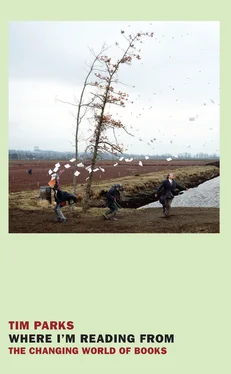The habit of imagining the writer as more well-meaning than he or she probably was is even more curious when we turn to academe. Usually hostile to any notion that knowledge of a writer’s life illuminates his work—“Biographical Fallacy!” one professor of mine would thunder—academic critics nevertheless tend to assume that the author is a solemn soul devoted to profound aesthetic enquiries and invariably progressive narratives. So for Linda Shires, in Tess of the D’Urbervilles , Thomas Hardy was “educating his readers by defamiliarization,” something that “is the primary goal of a novelist who would have us treat women differently, alter linguistic conventions, and reform the institutions that misshape women as much as language.” While for Paul Davies, Beckett “veritably hunted realism to death,” where realism is understood to be the convention underpinning bourgeois complacency.
This is biography, not criticism. We are being told of a plan the author had to improve the world. Unfortunately, Shires’s remarks give us no sense of why Tess is such an absorbing read, nor does any careful attention to the life or indeed the book suggest that this is what is really going on in the writing. It’s true that Hardy said he wanted “to demolish the doll of English fiction,” but what he was talking about was the freedom of the writer to evoke the lure and terror of sexual experience.
As for Beckett, it is truly hard to see his work as politically motivated. His manner of relating to others in his personal life and in print is to say something and immediately unsay it, declare and then deny. Again and again in the novels he builds up a credibly realistic scene, then steps rapidly away from it: “There’s a choice of images!” remarks Malone, having offered us a moving description of his hero Saposcat. His words “went dead as soon as they sounded,” says Murphy’s girlfriend of Murphy. In his strangely contorted letters to Duthuit, after championing a form of expression free from all relation to the world, Beckett warns: “Bear in mind that I who hardly ever talk about myself talk about little else.” In the end, the image he uses to clarify this conundrum is excretion: his writing is something he shits or vomits. He produces it, has to produce it, it is of him, but it is not about anything nor purposefully meant, and he wishes to push it away from himself as soon as possible—a sort of enactment of self-loathing. This is a fascinating pronouncement on the creative process (Byron said something similar), but hardly the description of a noble task.
Returning then to these overgenerous biographies, and to the constant insinuation of academe that writers are talented laborers in a good cause, one can only assume that they are satisfying a general need to reinforce a positive conception of narrative art, thus bolstering the self-esteem of readers, and even more of critics and biographers, who in writing about literature are likewise contributing to the very same good causes. Authors themselves, though often contradicting this positive image in private (Dickens frequently acknowledged that certain negative characters in his books were based on himself), soon learn how to play the part. Beckett must have been aware of how those famous author photos, suggesting a lean, suffering asceticism, fed the public’s perception of an austere and virtuous separateness. “How easy,” wrote Beckett’s friend Emil Cioran, “to imagine him . . . in a naked cell, undisturbed by the least decoration, not even a crucifix.” Actually Beckett was sharing a spacious flat in central Paris with his lifetime companion, Suzanne, spending weekends and summers with her in their country cottage, but drinking heavily with friends (never Suzanne) most evenings and generally making time for mistresses when possible.
But let’s finish with Faulkner’s Nobel Prize acceptance speech, a masterpiece in having it both ways: “I feel this award was not made to me as a man,” he begins with apparent humility, seemingly denying personal prowess and heading off, as Faulkner always did, the all-too-evident relations between his stories and his biography, “but to my work, a life’s work in the agony and sweat of the human spirit.” All the attention must be on the work, but as a manifestation of saintly human endeavor. Whose? Faulkner’s of course.
WHEN WAS IT exactly that becoming a writer started to be seen as a career choice, with appropriate degree courses and pecking orders? Does this state of affairs make any difference to what gets written?
At school we were taught two opposing visions of the writer as artist. He might be a skilled craftsman bringing his talent to the service of the community, which rewarded him with recognition and possibly money. This, they told us, was the classical position, as might be found in the Greece of Sophocles, or Virgil’s Rome, or again in Pope’s Augustan Britain. Alternatively the writer might make his or, by now, her own life narrative into art, indifferent to the strictures and censure of society but admired by it precisely because of a refusal to kowtow. This was the Romantic position as it developed in the late eighteenth and nineteenth centuries.
Let’s leave aside how accurate this is historically; it’s what they taught us and it got stuck in our heads: on the one hand the writer as artisan whose personality was hardly important, the prevalent situation in preindustrial times, when writers were few and held subordinate roles in fairly rigid hierarchies (a Petrarch or a Chaucer); on the other the writer as a charismatic superman (the Byrons and Shelleys) whose refined sensibility and creative powers gave him the right to transgress and question his community’s rules. This vision suited a time of tension between individual and mechanized mass society. The Romantic writer helped the reader fight back against the homogenizing pressures of a modern industrialized world.
As we know, T.S. Eliot rather complicated matters by telling us that writers had to overcome their personalities and find a place in the literary tradition; their work would only be truly distinctive when it marked the next development in the natural unfolding of the collective imagination as manifested in “the canon.” To the perplexed adolescent I was when I read Eliot, this sophisticated consideration seemed to offer a compromise between the classical and Romantic positions. But only at first glance. Read carefully, Eliot was more Romantic than ever: only those who had real personality, special people like himself, would appreciate what a burden personality was and wish to shed it. For these special people, literature became the drama of the sublimation or sacrifice of self through exploration of the work of other equally special people who came before them, to whose achievements they then added their own individual contributions. There was something painful and noble about this endeavor that raised the writer to a pantheon worshiped by an elite. Above all Eliot stressed that the creation of literature would require endless hard work over many years and quite probably a degree in the classics and/or modern European literatures. The young aspirant now had a core curriculum to follow to become a writer, but knew that it would require many years of hard labor.
Still, none of this prepared us for the advent of creative writing as a “career.” In the last thirty or forty years, writers have had to become people who travel along a well-defined career track, like any other middle-class professionals, not, however, to become craftsmen serving the community, but to project an image of themselves (partly through published work, but also in dozens of other ways) as artists who embody the direction in which culture is headed. In short, the next big new thing. A Doris Lessing. Rushdie. A Pamuk.
Читать дальше












